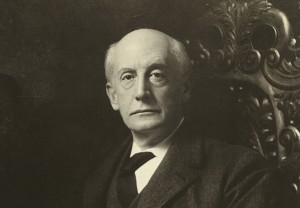 Moorfield Storey
Moorfield Storey
One of my first in-depth introductions to Moorfield Storey was M.A. DeWolfe Howe?s book, Portrait of an Independent: Moorfield Storey 1845?1929. Storey was a fascinating man and ought to be a major hero to libertarians. Let us start with the fact he was a Grover Cleveland Democrat, a defender of depoliticized markets, an opponent of protectionism and an advocate of gold. He was a leader in the New Democratic Party which opposed the policies of William Jennings Bryan. What makes Storey interesting is the rest of the story, or in this case, the rest of the Storey.
Storey was also a major opponent to U.S. interventionism during the birth of American empire building: The Spanish-American War. Storey, a Boston lawyer, became the president of the The Anti-Imperialist League. In addition to that role he was the first president of the National Association for the Advancement of Colored People, the NAACP. Storey was a defender of individual rights particularly the rights of minorities. He defended immigrants as well during the wave of anti-immigration hysteria that gripped the US in Storey?s time.
I recently saw a signed statement by Storey, one I wish I could afford to buy, where he wrote:
?Between the principle of freedom, that all men are entitled to equal political rights, and the dogma of tyranny, that might makes right, there is no middle ground.?
It was signed Moorfield Storey, March 2, 1920.
There are a few minor flaws in the statement but I like the intentions and spirit of it.
Storey fought a case before the Supreme Court in 1917 that overturned a segregation law in Louisville, Kentucky, on the basis of property rights. In Buchanan v. Warley, Storey argued the law violated the rights of property owners to sell their homes to whomever they wished. The Supreme Court states Storey?s argument well in their ruling. He said the law:
??violates the Fourteenth Amendment of the Constitution of the United States, in that it abridges the privileges and immunities of citizens of the United States to acquire and enjoy property, takes property without due process of law, and denies equal protection of the laws.?
The Court also described well the views of the segregationists:
?This drastic measure is sought to be justified under the authority of the State in the exercise of the police power. It is said such legislation tends to promote the public peace by preventing racial conflicts; that it tends to maintain [p74] racial purity; that it prevents the deterioration of property owned and occupied by white people, which deterioration, it is contended, is sure to follow the occupancy of adjacent premises by persons of color.?
Disgusting, but this was 1917. However, Storey prevailed and the law was overturned. This was a victory for individual rights, property rights and for one libertarian lawyer, Moorfield Storey. The ruling was the first exception to state segregation laws and is now seen as a precursor to the Brown v. Board of Educationruling of 1954. Law Professor David Bernstein calls the case ?one of the most significant civil rights cases decided before the modern civil rights era.? Bernstein notes that the ruling impeded the attempts of whites to prevent blacks from moving to urban areas. He says that the ?African-American urban population in the United States almost doubled between 1910 and 1929?? By coincidence 1929 is the year of Storey?s death.
It is possible that this relatively unknown libertarian lawyer, unknown in our modern age that is, may have turned the tide for the civil rights movement. Bernstein finds between 1868 and 1910 the Supreme Court heard 28 cases regarding the rights of African Americans but that blacks lost 22 of those cases. From 1920 and 1943, after Storey?s success, the court heard 27 such cases and African Americans won 25 of them.
Storey is someone I can admire, admire greatly. Here is an excerpt from Howe?s introduction which eloquently describes Storey, but one that applies to any true libertarian.
?The Independent in American life and politics is frequently a minority man. When the majority come over to his way of thinking, his instinct for unpopular causes, his habit of a Voice crying in the Wilderness, often induces something akin to loneliness in him ? the well-know loneliness of the crowd ? and off he goes to the espousal of a new minority cause. The great majority, to which, in the very nature of the case, most of us belong, regards this species of knight-errantry as a foolish, futile, and often troublesome thing. Why disturb the comfortable existing order? The last election , says the great majority, settled all that. If the country at large had not wanted to raise the tariff, to hold the Phillip pines, to keep out of the League of Nations, to endorse and enforce the Eighteenth Amendment ? indeed, to adopt any of the courses approved by congressional majorities, it would not have chosen the legislators and executives who now control our national policies. Of course there must be an opposition ? a conflict between the ?ins? who naturally want to remain where they are and the ?outs? who naturally want to take their place. This is to be expected. But the foolish, futile, troublesome Independent, never committed for more than a single campaign to any party, caring more for a cause than for a candidate and a label ? what a nuisance he is! Out upon him!
This is not far from the popular view of the congenital Mugwump. Yet there is another view, and, with the considerable erasure of party lines which has taken place in recent years, others besides congenital Mugwumps have come to admit that there is something to be said for it. This is the view that the Independent, whether in the minority or for the moment in the majority, serves a substantially valuable purpose in present-day affairs. It is he who keeps raising awkward questions, who is not satisfied with leaving a second-rate well enough alone, whose conscience insists upon talking out loud instead of whispering the confidences that so many of us keep locked in our bosoms. He is doomed to many disappointments and disillusions. He is tempted, and, being no less human than mankind in general, sometimes yields to the bitterness against contemporaries who could accomplish many things that seem good in his eyes and in reality accomplish so few. Through the very fact of his frequent association with minorities, he forgoes the larger opportunities that fall to consistent members of the majority in giving the forms of finality to public policies. But it is through him that these forms, when they fall short of their highest possibilities, fall short also of finality. He is the man who embodies the idea that nothing can be settles until it is settled right. He is often a remarkably uncomfortable fellow to have about, but when you look at his activities in the large, at the tendency they represent, rather than at their frequently irritating details, you are bound to admit, not merely that the community would be much poorer and weaker without him, but that he embodies a positive element of its richness and strength.
Of the type of Independent to which Moorfield Storey belonged, there is at least one more thing to be said ? a thing peculiarly applicable to him. It is the glory of the Independent, perhaps not least in his own eyes, that partianship is foreign to him, that he is free to detach himself from bonds that restrain others, to ally himself with any interest that seems at a given time entitled to his respect and support. He is inclined to look down upon the partisan, the man who clings through thick and think to any organization, especially in the field of politics. He would scorn the attribution of partianship, and reject indignantly the name of partisan. Yet often ? and hardly ever more clearly than in the case of Moorfield Storey ? he is a Partisan of Ideas. Allegiance to a political party may mean little or nothing to him. He may even look upon it as a sort of distillation of chauvinism from which his whole nature revolts. But an idea, like that of abstract justice of the defense and rescue of the under dog, may hold him for a lifetime, may sustain him in his adherence to any number of righteous causes, and make him so eminently, so victoriously, just such a Partisan of Ideas, as Storey was.?
Great! I concur completely and confess that I too am a Partisan of Ideas.

If you wish to support these columns donate on our page at Patreon.

